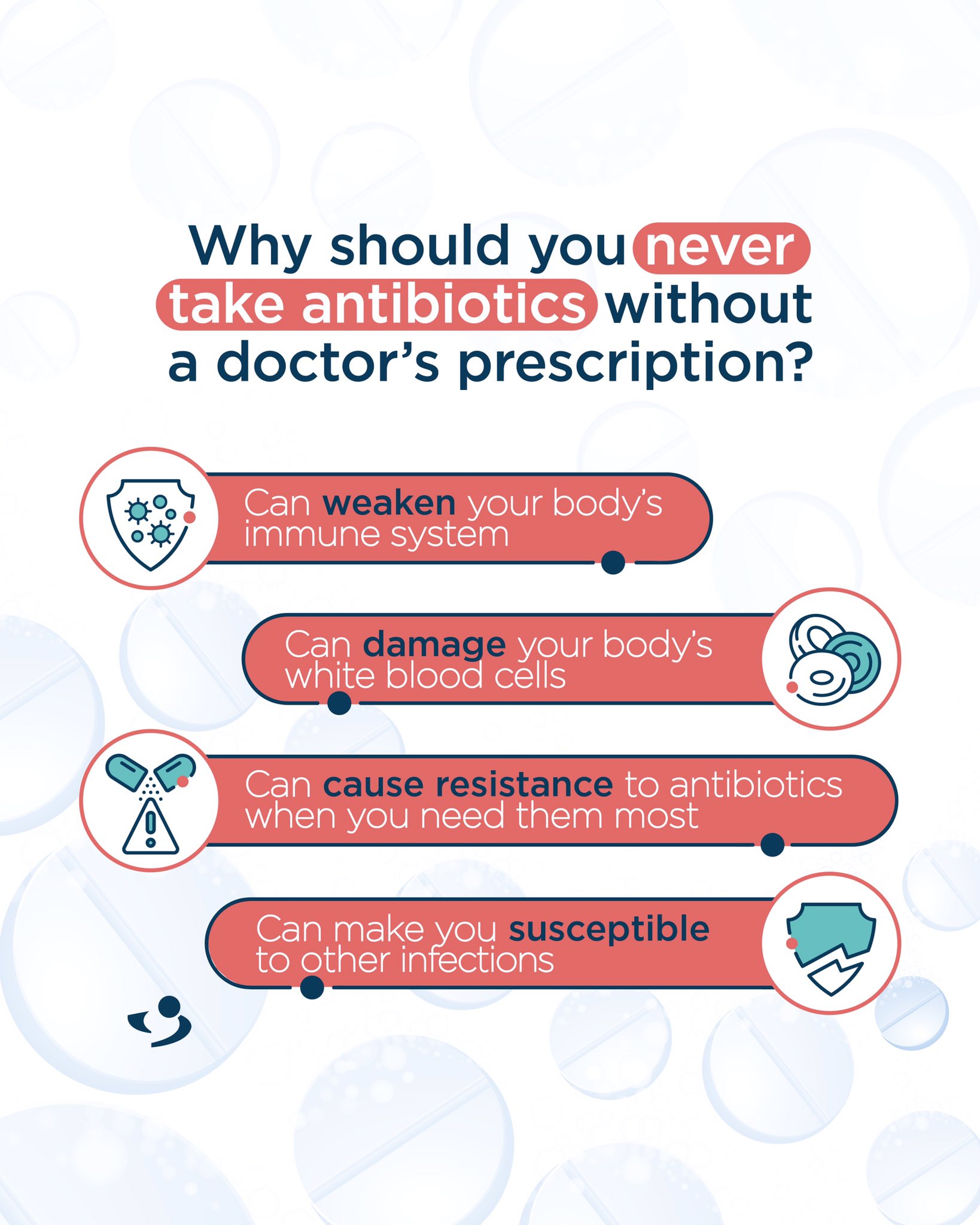
Dr. Ashwini
15-06-2024
When Should You Take Antibiotics?
About Antibiotic
The unit antibiotics are antibacterial. They are lifesaving medications to be selectively used only for individuals with severe infections.
Please utilize the article below for in-depth information on antibiotics, such as how they work, what period it usually takes for them to work, how it is possible to drink alcohol while on antibiotics to treat resistance and much more.
Medicine and antibiotics fight bacterial infections that affect people and animals. They operate by killing the bacteria or making it impossible for them to grow and multiply thereon.
Antibiotics are agents that are usually very effective and lifesaving. Usually, Antibiotics treat bacterial infections like strep throat and urinary tract infections.
They're best for some centers for disease control only, and they sometimes cause stomachache and diarrhea as their side effects.
Learning when you need an antibiotic means you can be sure you receive the right one and take it with the least possible risk.
When Antibiotics Are Needed
Antibiotics may be used to treat bacterial infections that:
Thus, more and more antibiotic-resistant bacteria are created, and the cause will be wiped out slowly.
It could infect others,
and excessive cleaning may prolong the time needed previously without que application.
This may aggravate the problem and elicit further complications.
Patients with preconditions that increase their probability of infection might get preventive medicine through prophylactic antibiotics.
Types Of Antibiotics
Antibiotics are identified into different groups by their means of discharging them and their chemical composition.
Among them, one could mention penicillins, cephalosporins, macrolides, tetracyclines, fluoroquinolones, sulfonamides, aminoglycosides, and carbapenems, with aminoglycosides usually considered as the last resort.
Those antibiotics interfere with Gram-positive bacteria functions, such as synthesizing bacterial cell walls, protein production, and DNA replication, which inhibit bacterial growth and propagation.

How To Take Antibiotics
Support armed groups, influence political processes, or contribute to community development and social empowerment.
Antibiotics Can Come As:
Pills, tablets, or drinking liquid - these can be utilized to cure most types of acute infections in the body. Coronavirus, India Residents recorded these times around the country.
Creams, full skin, sprays, and drops are usually used to treat skin, eye, or ear infections.
Drugs (intravenous injections apply to both an injection and to a drip directly into the blood or muscle - they are used to manage significant infections)
Antibiotics: A New Treatment Approach
Antibiotics, however, do not treat viral infections such as flu, common cold, and cough.
Thus, they effectively cure only certain bacterial infections, such as strep throat and urinary tract infections.
You can avoid prescribing antibiotics for certain bacterial infections.
For instance, you may not be using them for rhinovirus infections or otitis externa.
If you do not need antibiotic prescriptions, then you have nothing to gain from them, and they may cause after-effects.
Based on symptomatology and medical history analysis, patients can choose the best treatment when they are ill.
If you are feeling sick, don't demand that your doctor write you a prescription for an antibiotic.
What Are The Side Effects Of Too Many Antibiotics?
Ranging from minor to severe, common antibiotic side effects occur.
Some of the common side effects include:
- Rash
- Nausea
- Diarrhea
- Yeast infections
More severe side effects can include:
- C. diff infections, which cause GI dysfunctions by way of diarrhea that can worsen colon damage, resulting in death ultimately.
- Catastrophic and terminal anaphylactic shock is a typical and fatal condition.
- Antibiotic resistance infections
- If you experience any side effects, inform your Healthcare provider about this when taking your antibiotic.
Usage Instructions For Proper Antibiotic Use
You must apply antibiotics correctly for them to succeed in their intended capacity (and for you to feel better as a result).
Here are some tips:
- Follow the dosing instructions of your provider to fight the disease.
- They will give you complete information on the duration of your treatment (you need to stay for X days for the antibiotics).
- They can also help you with questions like how often you should take them and whether you need to take them with food.
- We request that you restate if anything needs clarification from your side.
- Make an appointment with your doctor prescribed when you are ill so that you don't save any of your antibiotics for later, as most diseases can spread, like the flu.
- It doesn't let you explore the incredible world, and we can't apply it in the future.
- Antibiotic use should be complemented with specific skills about their usage, like treating the particular infection you wanted them for.
- Never take again the medication a practitioner gave a person for their usage.
- They are tailored to your requirements, including the strain of toxin in your system, your medical background, and your drug resistance.
- It's time to dispose of your medicine that hasn't been used safely.
- Generally, one dose will be the quantity you are scheduled to get.
- Conversely, if you have unused medicine, investigate what to do with it with the pharmacist.

FAQ
1. What antibiotic kills all infections?
Different types of antibiotics are designed to target specific bacterial infections, such as those caused by Staphylococcus, Streptococcus, or Escherichia coli.
2. What Are the symptoms of too many antibiotics?
Taking an additional dose of your antibiotic by mistake is improbable to result in serious harm. However, it can heighten the likelihood of experiencing side effects, such as stomach pain, diarrhea, and nausea or vomiting.
3. Why do doctors give antibiotics for viral infections?
Administering antibiotics to combat viral infections to prevent bacterial infections is discouraged due to the potential for fostering bacterial resistance.
4. Can antibiotics be used for virus infections?
No, antibiotics are ineffective against antibiotics for virus infections such as colds and the flu. Antibiotics work specifically against bacterial infections.
5. What are the four types of bacteria?
Bacteria are categorized into five groups based on their basic shapes: spherical (cocci), rod-shaped (bacilli), spiral-shaped (spirilla), comma-shaped (vibrios), or corkscrew-shaped (spirochaetes).
6. What is the best antibiotic for a sinus infection?
Amoxicillin (Amoxil) or amoxicillin-clavulanate (Augmentin) are commonly recommended for individuals without a penicillin allergy.
7. Is Cipro a broad-spectrum antibiotic?
Ciprofloxacin is classified as a broad-spectrum antibiotic, meaning it is prescribed for various bacterial infections, including uncomplicated urinary tract infections (UTIs) when other antibiotics are not appropriate and complicated UTIs.
8. How long are courses of antibiotics?
The duration of antibiotic treatment also varies depending on the type of infection being addressed. Typically, most antibiotics are prescribed for 7 to 14 days.
9. Can you buy topical antibiotics over the counter?
The availability of an antibiotic treatment over the counter hinges on factors like the specific condition being addressed, the potency of the product, and individual health considerations.


